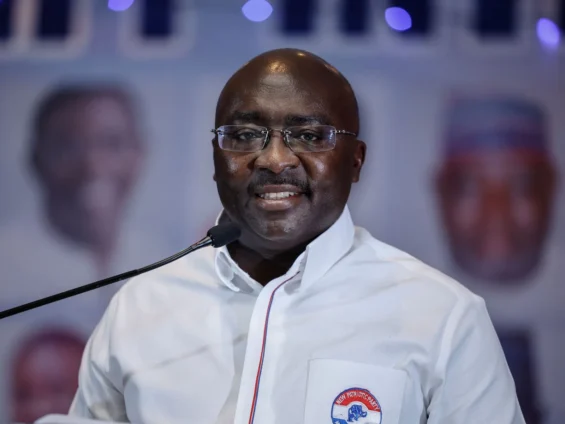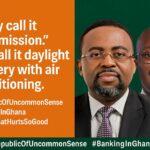Accra — In the lead-up to the New Patriotic Party (NPP) flagbearer contest for 2026, tensions are rising over divergent leadership narratives. At the heart is Dr. Mahamudu Bawumia, former Vice President, whose early concession in the 2024 presidential election has been widely praised as an act of democratic maturity. By contrast, rival aspirant Kennedy Ohene Agyapong has drawn sharp criticism for comments deemed un-presidential and dangerous to Ghana’s democratic tradition.
Bawumia’s Early Concession: Peace First
Bawumia’s decision to concede defeat before the Electoral Commission of Ghana (EC) officially declared results sent a strong signal of statesmanship. The diplomatic community in Ghana lauded him: “Your grace in accepting the outcome of the elections is not only a reflection of your integrity but a profound contribution to Ghana’s democratic credentials,” said H. E. Maher Kheir, Dean of the Diplomatic Corps.
The article “His finest hour yet: The Bawumia concession and lessons in leadership” described how his gesture “pre-empted what many saw as a potentially volatile situation” and underscored that “by openly, readily and speedily accepting the electoral outcome, Dr Bawumia demonstrated his true character: humble, peaceable, conciliatory, mature and wise.”
In his own words, the former VP explained his move as being driven by concern for national peace: he said that his party’s internal collation had by midnight of December 8, 2024 known the outcome and that “waiting for days of EC collation would lead to unnecessary tensions and potential disturbances.”
This conduct has earned him commendations from religious organisations, business networks and civil society, all of whom view it as embodying the principle that elections are about contesting ideas, not creating chaos.
Agyapong’s Warning: Rhetoric or Risk?
By contrast, Kennedy Agyapong has adopted a markedly different tone. During his campaign, he declared “I will never concede defeat until the Electoral Commission declares results.”
This statement sparked unusually sharp backlash. Akosua Manu, special aide to Bawumia, said the remark was “the biggest threat to our democracy” and warned that “publicly admitting a willingness to let the country burn before conceding” undermines the foundations of Ghana’s political stability.
Critics argue his remarks reveal a disregard for the delicate balance between political competition and national cohesion. In a country that prides itself on democratic transitions, such an admission by a senior party figure is seen as irresponsible.
Why the Difference Matters
One key lesson from Bawumia’s early concession is that the act of conceding is not weakness but responsibility. In national politics, the option to lose well can strengthen institutions, reassure investors and calm tensions. The Diplomatic Corps noted that his behaviour “reinforced the confidence and trust of the international community in Ghana’s democratic governance.”
In contrast, Agyapong’s “never concede” stance may appeal to some party loyalists, but it carries broader risk. Observers warn that refusing to accept credible outcomes can sow distrust, polarise supporters, and ignite unrest. The commentary in The Power and Peril of Concession – Lessons from Ken Agyapong’s Defiance warns that such rhetoric “is a statement steeped in political meaning and national consequence” and could harm Ghana’s reputation as a stable democracy.
In a democratic system, political leadership must balance ambition with restraint. While competition for the flagbearer role is real, the way contenders conduct themselves—especially in messaging on loss and transition—matters for the nation beyond party politics.
Implications for the NPP and Ghana
As the NPP moves toward its 2026 primaries, the contest between Bawumia and Agyapong presents a choice about the tone of leadership. Bawumia offers a narrative of unity, statesmanship, and global credibility. Agyapong projects a combative, no-compromise style that many fear could upend the equity Ghana has achieved in electoral transitions.
Within the NPP, delegates and stakeholders must now reflect not only on who can win electorally but who can lead responsibly when victory is not immediate. The decision may define the party’s image and Ghana’s democratic path for years to come.
Moreover, Ghana’s broader political environment is watching closely. Elections in West Africa have too often been followed by violence, disputed outcomes and institutional breakdown. Ghana’s comparative advantage has been peaceful transfer of power. Any rhetoric that jeopardises that advantage is a worry.
Final Word
Dr Bawumia may have accepted defeat early, but in that act he gained far more than a concession—he gained respect, stability and proof that leadership is more than winning. Meanwhile, Kennedy Agyapong’s remarks risk drawing the NPP into a mindset of conflict rather than contest. Ghana has chosen democracy over violent takeovers. It now needs leaders who protect that choice, not undermine it. The upcoming flagbearer race is as much a test of character as it is of popularity. If Ghana is to remain a model of democratic maturity, the message coming from the competition must be one of peace, not provocation.




